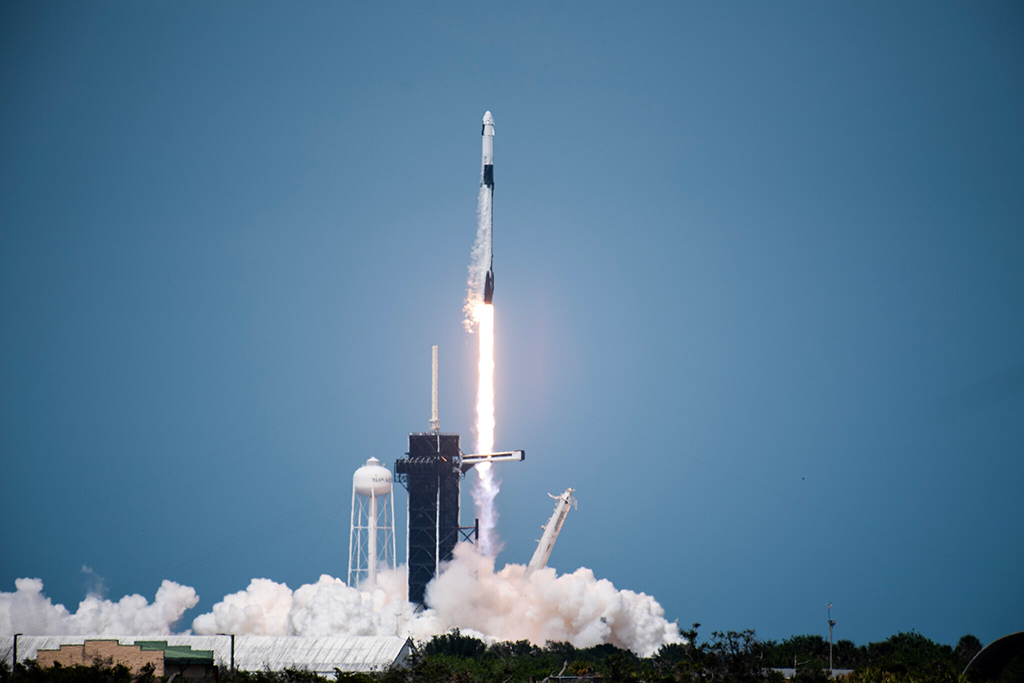
While humanity has been convulsed on Earth by coronavirus and the protest against racism in the US has gone global, for the first time a private US company, SpaceX, on 30 May put into orbit –and the following day delivered two astronauts to– the International Space Station (ISS), a multilateral project that continues operating despite the geopolitical tensions 400 kilometres below. A new era has thereby dawned in the space race.
The great entrepreneur that is Elon Musk (the man behind Tesla cars and creator of PayPal), after overcoming a wall of scepticism, has set his sights on the Moon, where the White House wants NASA to return in 2024, and whose dark side has been visited by China in an unmanned expedition. He then wants to take people to Mars. Crew Dragon reached the ISS –with which a similar capsule had docked last year, unmanned but with a window– thanks to the propulsion of the Falcon 9 rocket that, by virtue of being recoverable and reusable (unlike previous rockets) enables costs to be reduced. All this coincides with the 51st anniversary in July of the first moonwalk by Neil Armstrong and his ‘giant leap for mankind’, which was closely related to the competition inherent in the Cold War at the time.
NASA had lost its ability to launch humans from US soil when it retired the reusable Space Shuttle in 2011. It has been using Russian Soyuz rockets to ferry its astronauts to the ISS. What has just been achieved is even more important given the new space race under way between the great powers: essentially the US, Russia, China, Europe, India and Israel (only the first three have sent people into orbit, although there have been astronauts of many nationalities). This race is gaining geopolitical importance, and the same goes for space itself. The Moon is one of its primordial targets, followed by Mars, plus of course the ability to operate in near-Earth orbit with new artefacts. It is no coincidence that following the launch of the Crew Dragon, the US President, Donald Trump, declared ‘We have created the envy of the world and will soon be landing on Mars and have the greatest weapons ever imagined in history’. Was he thinking of a new type of non-terrestrial militarisation of space? Now it has come down to a race between developmental models for an industry that generates so much innovation. It is no longer simply nation states that are vying with each other, but companies too. Elon Musk and SpaceX –founded in 2002 to take civilisation beyond Earth– are not alone in the US private sector, where a joint venture between Lockheed and Boeing is also prominent. And in their wake comes a company like Virgin Galactic, founded by Richard Branson, which has already conducted suborbital flights and is proposing flights for space tourists.
Although such activities seem the most newsworthy, despite their quite literally astronomical prices, the prospect of immense industrial potential is opening up, above all for the pharmaceutical industry, additive manufacturing (3D printing) and other, as yet unknown, activities, as well as, at some point in the future, mining.
The success of SpaceX was not guaranteed. The first three launches of Falcon 1 failed. The prototype of the giant capsule the company is developing for expeditions to Mars, Starship, exploded one day before the great triumph. But it demonstrates that private business can emulate the success of states, although many at NASA would have liked to preserve their public monopoly.
All of this private endeavour does not mean that NASA lacks control over the entire process, in the US case what it calls its ‘commercial crew programme’. For the time being the two astronauts, who still have to return in four months or so for the trial to be deemed a complete success, belong to NASA.
This new space race corresponds to the idea of ‘missions’ that Mariana Mazzucato advocates for a European space programme that is hamstrung in comparison with the dynamism of the US and China.
Space represents a promising field for the new industrial policies in Europe. Even for Spain, it is a sector that could provide a great deal of innovation and added value. Spain has pledged to contribute €1.2 billion to the European Space Agency (ESA) by 2024, 8.3% of the budget to be provided by member states.
Five decades since man first reached the Moon, at the dawn of this second space age, giant corporations are increasingly important actors in this world and the one that is impending. In space too, the future –and the present– are taking on an increasingly public-private character.


